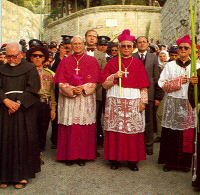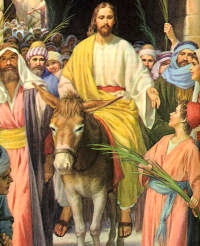Lent: April 5th
Palm Sunday of the Lord's Passion
Old Calendar: Palm Sunday ; Other Titles: Palm Sunday; Hosanna Sunday; Fig Sunday; Flowery Festival;
So they took branches of palm trees and went out to meet him, crying, "Hosanna! Blessed is he who comes in the name of the Lord, even the King of Israel!" And Jesus found a young ass and sat upon it; as it is written, "Fear not, daughter of Zion; behold, your king is coming, sitting on an ass's colt!" (Jn 12:13-15).
Today we commemorate Christ's entry into Jerusalem for the completion of the Paschal Mystery. In the old calendar before Vatican II, the Church celebrated Passion Sunday two Sundays before Easter, and then Palm Sunday was the beginning of Holy Week. The Church has combined the two to reinforce the solemnity of Holy Week.
The Palm Sunday procession is formed of Christians who, in the "fullness of faith," make their own the gesture of the Jews and endow it with its full significance. Following the Jews' example we proclaim Christ as a Victor... Hosanna to the Son of David! Blessed is He who comes in the Name of the Lord. But by our faith we know, as they did not, all that His triumph stands for. He is the Messiah, the Son of David and the Son of God. He is the sign of contradiction, acclaimed by some and reviled by others. Sent into this world to wrest us from sin and the power of Satan, He underwent His Passion, the punishment for our sins, but issues forth triumphant from the tomb, the victor over death, making our peace with God and taking us with Him into the kingdom of His Father in heaven.
Today is the feast of St. Vincent Ferrer which is superseded by the Sunday Liturgy.
Liturgy for Palm Sunday
 The priests and deacons wear red vestments for Mass. There is a special entrance at the beginning of each Mass, either simple or solemn. This includes a blessing of the palms and the gospel reading of the entrance into Jerusalem (Matt 21:1-11; Mark 11:1-10; John 12:12-16; Luke 19:28-40). The introduction by the priest explains the solemnity of Holy Week, and invites the faithful to take full part in the celebration:
The priests and deacons wear red vestments for Mass. There is a special entrance at the beginning of each Mass, either simple or solemn. This includes a blessing of the palms and the gospel reading of the entrance into Jerusalem (Matt 21:1-11; Mark 11:1-10; John 12:12-16; Luke 19:28-40). The introduction by the priest explains the solemnity of Holy Week, and invites the faithful to take full part in the celebration:
 The priests and deacons wear red vestments for Mass. There is a special entrance at the beginning of each Mass, either simple or solemn. This includes a blessing of the palms and the gospel reading of the entrance into Jerusalem (Matt 21:1-11; Mark 11:1-10; John 12:12-16; Luke 19:28-40). The introduction by the priest explains the solemnity of Holy Week, and invites the faithful to take full part in the celebration:
The priests and deacons wear red vestments for Mass. There is a special entrance at the beginning of each Mass, either simple or solemn. This includes a blessing of the palms and the gospel reading of the entrance into Jerusalem (Matt 21:1-11; Mark 11:1-10; John 12:12-16; Luke 19:28-40). The introduction by the priest explains the solemnity of Holy Week, and invites the faithful to take full part in the celebration: Dear friends in Christ, for five weeks of Lent we have been preparing, by works of charity and self-sacrifice, for the celebration of our Lord's paschal mystery. Today we come together to begin this solemn celebration in union with the whole Church throughout the world. Christ entered in triumph into his own city, to complete his work as our Messiah: to suffer, to die, and to rise again. Let us remember with devotion this entry which began his saving work and follow him with a lively faith. United with him in his suffering on the cross, may we share his resurrection and new life.
The palms are blessed with the following prayer:
Almighty God, we pray you bless these branches and make them holy. Today we joyfully acclaim Jesus our Messiah and King. May we reach one day the happiness of the new and everlasting Jerusalem by faithfully following him who lives and reigns for ever and ever. Amen.
As the faithful, we remember and dramatize Christ's triumphal entrance into Jerusalem on a donkey. In Jesus' time, a huge crowd assembled, put their cloaks or branches on the ground, and waved palm branches, acclaiming Christ as the King of Israel, the Son of David. We now wave our palm branches and sing as the priest enters the church:
Hosanna to the Son of David, the King of Israel.
Blessed is he who comes in the name of the Lord.
Hosanna in the highest.
These words of praise are echoed every day at the Holy Sacrifice of the Mass at the Sanctus (Holy, Holy).
Our joy is quickly subdued. We are jolted to reality and see the purpose of Christ coming to Jerusalem by the reading of the Passion at the Gospel. (Written by Jennifer Gregory Miller)
Things to Do:
- The palms distributed at Mass are blessed, so are sacramentals. Read Blessed Palms in the Home.
- Read Pope Francis' Homily for Palm Sunday 2014. Also read the History of Palm Sunday by Fr. Francis X. Weiser
- In some places the 6th Sunday of Lent is known as "Fig Sunday" due to the tradition that Christ ate figs after his entry into Jerusalem. Adding some type of figs to your meal would be a nice touch.
- In the Extraordinary Form Calendar the Fifth Sunday of Lent was Passion Sunday, known as "Carling Sunday" after carling peas in some parts of England and Scotland. In the Ordinary Form the Sixth Sunday of Lent is a combination of Palm and Passion Sunday. Peas porridge would also be an appropriate dish for today. See recipes for suggestions and history behind this tradition.
- Read the short passages from Directory on Popular Piety concerning Holy Week and Palm Sunday.

No comments:
Post a Comment